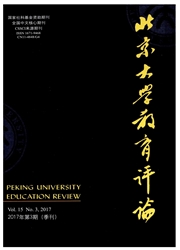

 中文摘要:
中文摘要:
h大学生就业问题始终是高等教育研究领域的重要问题,随着一线城市人口流入的大幅增加和历年毕业生人数的增加,高校毕业生更需要考虑与权衡就业地的选择。近两年北京入户指标大幅缩减,留在北京,还是逃离北京,成为毕业生的重要选择。基于2015年首都高校学生发展的数据所做的描述性统计发现,在首都高校非京沪生源毕业生中,希望留在北京工作的比例为43.99%,而实际留在北京工作的比例为40.30%。进一步的计量检验发现,来自中部地区、获得奖学金、有较丰富的实习经历、人文学科、月支出越高、父亲职业为管理技术人员的毕业生,有更大可能留在北京工作。对比留京毕业生与非留京毕业生群体的特征,发现留京毕业生群体在人力资本、家庭社会资本与京内求职资本这三个方面整体优于非留京毕业生。毕业生选择留京的影响机制,主要可以分为个人能力的正反馈、家庭社会经济优势背景的利用、北京作为首都的“拉力”影响,以及毕业生流动的“邻里效应”四个方面。因此,当前政策要关注家庭条件较差的毕业生,从择业予以帮助;同时,高校在人才培养中需要重视学生学业与社会实践的投入,增强毕业生求职竞争力;最后,高校与社会舆论应引导毕业生树立合理的择业观。
 英文摘要:
英文摘要:
The employment of college graduates has attracted much attention in higher education research during the past years. With the increase of first-tier citiesr population and college graduates these years, the em-ployment area selection of graduates is a significant part of the concept of employment. Living in Beijing, or leav-ing Beijing, has become opposite choice between different graduates. From the data of 2015, it shows that 43. 99% graduates who don’t come from Beijing or Shanghai want to live in Beijing, but there's 40. 30% who really work in Beijing after graduation. These graduates from middle of wastern erea of China, having been awarded scholarship, with rich internship experience, majoring in social science, with high monthly expenses and with their fathers being technical administrative members tend to hune jobs in Beijing. Comparing the two teams of graduates, it is obvious that graduates who work in Beijing are superior to those who leave Beijing in human cap-ital, family socio-economic status and in-Beijing-social capital. The influencing mechanism can be explained by four factors: positive fecdbackof personal ability,utiyization of the family background, pulling force of Beijin the capital of China and " neighborhood effect" . Therefore, this paper offers policy suggestions for government and college. Present policy should pay more attention to students with low economic status. Additionally, universities should focus on student’s practice and help graduates to achieve a correct and rational choice.
 同期刊论文项目
同期刊论文项目
 同项目期刊论文
同项目期刊论文
 期刊信息
期刊信息
